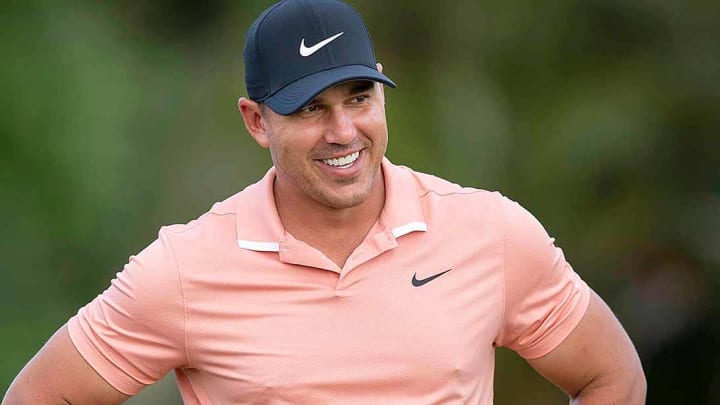LIV Golf Has Landed in the U.S., and Its Newest Members Have More to Talk About Than Just Money

NORTH PLAINS, Ore. – June 28, 2022, will be a seminal moment in the golf history books.
It’s the day that an interloper, LIV Golf, landed on the shores of North America and staked a claim for what some call the soul of golf.
A quick history lesson: President James Monroe in an 1823 message to Congress outlined the Monroe Doctrine, warning European nations that the U.S. would not tolerate any further colonization of the Western Hemisphere. It has been a bedrock principal of the United States foreign policy and national security ever since.
The PGA Tour did not need a Monroe Doctrine – it had always been big enough to keep potential colonialists away from its shores. Until now.
PGA Tour commissioner Jay Monahan admitted last week that the PGA Tour cannot win an arms race if the only weapons are dollars bills, because the PGA Tour can’t compete.
But that's exactly where the PGA Tour finds itself, and as the season goes on it will slowly lose its exclusivity in the 50 states as LIV Golf will play in New Jersey, Illinois, Massachusetts and Florida this year.
How did we get here?
How does the PGA Tour, one of the most successful organizations in sports history, find itself in the fight for their lives?
In listening to the six newcomers to the LIV Golf Tour on Tuesday in Portland, Abraham Ancer, Bryson DeChambeau, Matthew Wolff, Brooks Koepka, Pat Perez and Patrick Reed, it’s clear they are hardly disappointed to leave their Tour careers behind them.
Once you get past the money — which admittedly is hard to do — these players seem to like not having to work nearly as hard as they did on the PGA Tour. In some cases, they believe they have earned that right.
“What I've had to go through the last two years on my knees, the pain, the rehab, all this stuff, you realize, I need a little bit more time off,” Koepka said. “I'll be the first one to say it, it's not been an easy last couple of years, and I think having a little more break, a little more time at home to make sure I'm 100 percent before I go play in an event and don't feel like I'm forced to play right away. That was a big thing for me.”
Again, the money is a big part of this, but with the PGA Tour now starting to tap its own coffers and not only increasing purses, but creating big-money events for the elite players, the money is similar enough. So, you now must look at the intangibles when determining the best place to play.
“For me it's real simple, I'm 46. I've played 515 events, I've been on the road since 1998,” Pat Perez said of his decision to jump. “I've been on the road longer than Matt Wolff has been alive. I have an almost 4-year-old. I missed my son's birth last year. August 18, I get a call my wife's going into labor. I'm in Jersey. I'm getting ready to start the FedEx playoffs. I'm 116 on the list. I can't leave. I can't miss it. I can't get back. I can't get there and back without spending 150 grand on a private flight. I'm not doing that.”
For Perez, the changes the PGA Tour outlined last week, cutting the all-exempt tour from 125 to 70, would have affected him greatly. He finished between 70th and 125th on the FedEx Cup points list in each of the last four years, and the new rules would've effectively forced him to reapply for his card the last four years.
“I get to play seven this year and whatever else in the future,” Perez said. “It's a no-brainer for a guy my age that's been on the road. I just had three weeks off. I feel great. I couldn't be more excited about this, and that's the bottom line.”
Many players talked about their schedule, having time to heal and get prepared for the grind of the PGA Tour. Those may have been talking points, but as you listened to them, you started to believe that they believed what they were saying.
There is much to still sort out. No one knows for sure which way each of the four majors will go next year, and each player has made his decision with the understanding he may not play in a major ever again. They all seem comfortable with that decision.
Since both the DP World and PGA Tours have different rules and are under the laws of different governments, it seems that DP World Tour players to a large extent will not be prohibited from playing in DP World Tour events, but a hefty fine could be part of the rite of passage.
None of this is set in stone, especially if the courts get involved, but that has not happened yet.
And then if you are one of the older players, there is the issue of one day playing the Champions Tour.
“For me, if I were to do this for 40 years and I wanted to go back to the Champions Tour at 50, I don't see why I wouldn't be able to,” Perez said. “I'm not affecting the Champions Tour in the least. If I took four years off and I still made the money that I'd made, I'm still eligible and exempt for the Champions Tour. So, if that was a thing that came up, why would they stop me from playing?”
